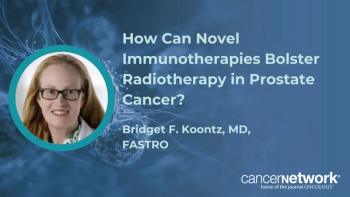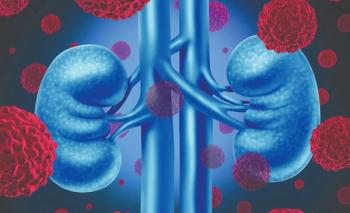
Abemaciclib May Show Synergistic Effect in Kidney Cancer Combination Trials
Although no responses were observed in 11 patients receiving abemaciclib monotherapy, combination therapies with abemaciclib may offer clinical benefit.
CancerNetwork® spoke with Bradley A. McGregor, MD, director of Clinical Research for the Lank Center of Genitourinary Oncology and medical oncologist specializing in genitourinary malignancies at Dana-Farber Cancer Institute, in Boston, Massachusetts, about results from a phase 1b study (NCT04627064) assessing the efficacy of abemaciclib (Verzenio) monotherapy in heavily treated patients with metastatic clear cell renal carcinoma (ccRCC). Specifically, he discussed how these results might offer insight into interpreting data related to the use of CDK4/6 inhibitors in combination with HIF-2α inhibitors.
McGregor highlighted the importance of single-agent activity in combination trials, noting that responses with one agent may be driven by another it is paired with. Additionally, he stated that an improvement in response rate in combination trials for abemaciclib would suggest a synergistic effect given the lack of clinical benefit abemaciclib monotherapy offered to patients with advanced RCC in the phase 1b study.
Of 11 patients reviewed in the study, 1 patient had stable disease, 8 experienced disease progression, and 2 were not evaluable for response, indicating no observed responses. The median progression-free survival (PFS) was 1.8 months (95% CI, 1.5-1.9), and the median overall survival (OS) was 9.1 months (95% CI, 2.1-15.3).
Patients within the nonrandomized study received standard abemaciclib dosing twice daily during a 28-day study cycle, with treatment continuing until radiographic progression, intolerable toxicity, or withdrawal. The primary end point was objective response rate (ORR). All patients discontinued study treatment, with disease progression (n = 8), patient decision (n = 2), and physician decision (n = 1) being cited as reasons for discontinuation.
McGregor presented these findings at the
Transcript:
When we look at the data on nivolumab [Opdivo] plus ipilimumab [Yervoy], for instance, one of the issues with the EMA was the contribution of components. Do patients need [ipilimumab, or is the activity] all driven by nivolumab? You need to have that single-agent activity.
What we have shown is that in this cohort of patients, we did not have any responses. As we look to see these combination trial [results], if there is a marked improvement in response rate comparable to what [we] may have expected to see with single-agent HIF-2α inhibitor [therapy], that would suggest that there is a synergistic effect. We showed that, from a contribution of components, abemaciclib alone would not seem to offer any clinical benefit.
Reference
McGregor BA, Xie W, Xu W, et al. Phase IB trial of abemaciclib in advanced renal cell carcinoma. Presented at: 2024 Kidney Cancer Research Summit; July 11-12, 2024. Boston, MA.
Newsletter
Stay up to date on recent advances in the multidisciplinary approach to cancer.



















































